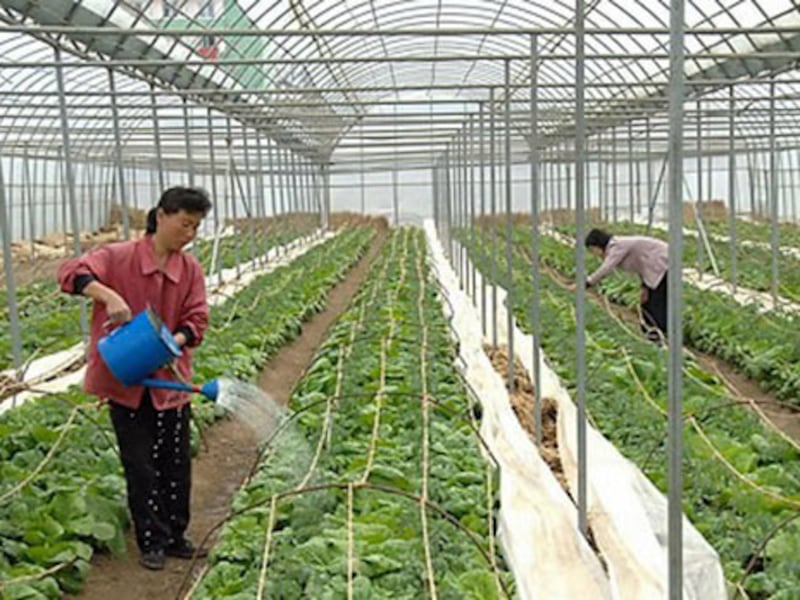North Koreans are once again fighting each other over human feces as they desperately try to fulfill the government’s impossibly high collection quotas to prepare fertilizer ahead of the spring planting season, residents in the country told Radio Free Asia.
In order to avoid punishment, adults have until Jan. 20 to donate 500 kilograms (1,100 pounds) of compost, which is a code word for feces. Elementary, middle, and high school students’ quota is 200 kilograms (440 pounds).
That’s way more than the 142 kilograms (312 pounds) the average person poops in an entire year, so merchants can make a fortune buying and selling it on the black market, and people resort to stealing it from public bathrooms and each other’s houses.
But that’s often when things turn violent, a a resident of the county in South Pyongan province, north of Pyongyang, told RFA Korean on condition of anonymity for security reasons.
“Two men in Unsan county were fighting each other with axes and shovels and were seriously injured,” he said. “A factory worker was trying to steal feces from an outhouse next to the other guy’s home.”
When he saw the factory worker trying to scoop out the contents of his latrine, the homeowner came out with a shovel and hit him, he said.
“The head of the neighborhood-watch unit brought the social security agent in charge of the neighborhood and the fight ended,” he said. “But both men were taken to the hospital.”
Battles galore
These are the latest known casualties in the annual “compost battle” -- the time each year where people are made to gather materials necessary to make fertilizer, but it’s not intended to be violent.
North Korea often assigns militaristic names to projects requiring participation from the public. For example, there’s a “construction battle” when it’s time to build new homes, and a “harvest battle” every fall.
Though the “combatants” in these battles are overworked, it’s only during the “compost battle” that places them in such cutthroat competition.

One collected by the farm, dry grass, chaff, and other materials will be added to the poop and it will dry and decompose to become fertilizer.
RFA was not able to confirm the extent of punishment for those who fail to meet their quota.
In another incident, a high schooler was caught scooping up the poop in the public toilet, the resident said. He received a scolding from his community leader.
“The head of the neighborhood watch unit flipped the student’s cart over and shouted at him,” he said. “Then the kid’s mother came out and argued with the watch unit leader, asking if the poop belonged to him. Things escalated and a full blown fight broke out.”
The people have to take their donations to nearby farms and submit a completed compost certificate to their workplace or school, a resident in the northwestern province of North Pyongan told RFA on condition of anonymity to speak freely.
After that, their company or school will add up all the donation certificates and report the amount to their superiors.
RELATED STORIES
Cruel summer: North Koreans ordered to provide human waste for fertilizer
Yearly ‘battle’ begins in North Korea over human waste for fertilizer
Citizens Fight Over Feces to Fill Human Fertilizer Quota in North Korea
Women, who typically do not have government-assigned jobs, have to submit their donations through the Socialist Women’s Union of Korea, the country’s largest organization for women," the second resident said.
But in North Korea, women are the primary breadwinners in most families. The salaries the men earn from their government-assigned jobs are nowhere near enough to live on, so while the men are at work, the women run family businesses, usually selling goods and services at the local market, to support the family.
But as far as the government is concerned, these women are “housewives,” she said. So their quotas are even higher, she said -- sometimes as high as 1 metric ton (2,200 pounds).
The woman worried about how she would be able to fill her quota this year, saying, “The communal toilets in the neighborhood are locked and inaccessible, so where can I find enough feces to produce compost?”
She said she can’t buy her quota on the market because her business hasn’t been good recently and there’s no money to spare.
“We have to steal pig waste piled up next to private pig pens or human feces from private toilets, which lead to frequent fights,” she said.
She also spoke of another incident where a woman stole pig waste from a farm, and another woman, the owner of the farm, grabbed her by the head and a fight broke out.
“The authorities can’t provide us food but force us to provide compost,” she said. “There’s no other country in the world where people fight over human feces. The authorities are responsible for this.
Translated by Claire S. Lee. Edited by Eugene Whong.
